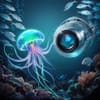MIT's LOBSTgER initiative is revolutionizing underwater photography by combining AI with field-based photographic data to document ocean life. The project, led by underwater photographer Keith Ellenbogen and MIT mechanical engineering PhD student Andreas Mentzelopoulos, uses generative AI to enhance and generate images of marine life, such as lion's mane jellyfish, blue sharks, and American lobsters.
The team collects high-resolution images of marine animals while free diving in coastal waters, building a comprehensive dataset of underwater images. Mentzelopoulos develops custom code to train latent diffusion models on Ellenbogen's images, enabling the generation of synthetic yet scientifically accurate images. The AI models can generate new images unconditionally or enhance real photographs conditionally, recovering details in turbid water, adjusting lighting, and simulating scenes impossible to capture in the field.
LOBSTgER aims to expand scientific storytelling by providing a visual vocabulary to deepen the public's connection to the natural world. By visualizing ocean life, the project seeks to raise awareness about environmental complexity and drive engagement and action towards conservation. The team plans to develop a comprehensive model to visualize various species in the Gulf of Maine and apply similar methods to marine ecosystems worldwide.
This innovative approach has the potential to transform our understanding of ocean life and inspire new conservation efforts. By harnessing the power of AI and underwater photography, LOBSTgER is poised to reveal the hidden wonders of the ocean and promote a deeper appreciation for the natural world.


